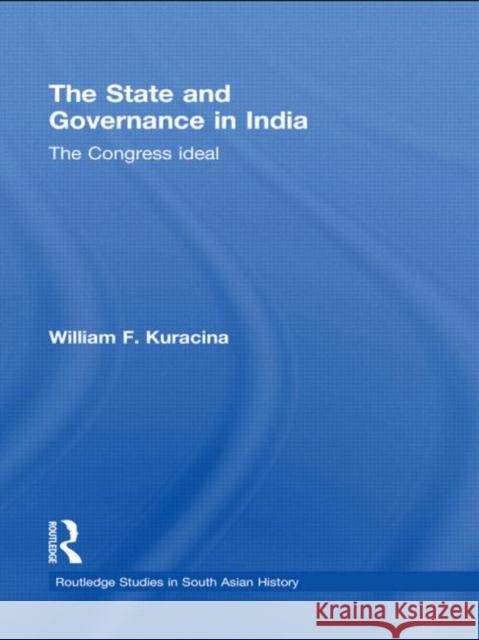The State and Governance in India: The Congress Ideal » książka
The State and Governance in India: The Congress Ideal
ISBN-13: 9780415779449 / Angielski / Twarda / 2009 / 246 str.
The State and Governance in India: The Congress Ideal
ISBN-13: 9780415779449 / Angielski / Twarda / 2009 / 246 str.
(netto: 699,68 VAT: 5%)
Najniższa cena z 30 dni: 705,23
ok. 22 dni roboczych.
Darmowa dostawa!
This book presents an innovative investigation of the policies of the Indian Congress during the late colonial period. Departing from the existing historiography of Indian nationalism, it analyses the extent to which Congress elites engaged in processes intended to foster nation-building in India. Rejecting the long-standing premise that the Congress primarily sought to generate a national identity, the author hypothesizes that Congress elites knowingly grappled with the creation of a national governmentality. He argues that they distanced themselves from lethargic nation-building exercises and instead opted to support more practical and more feasible state-building efforts. Accordingly, this book shows that Congress elites constructed the institutions that would enable Indians to govern themselves after India's liberation from British imperialism. It presents evidence which shows that Congress elites began to perceive themselves and their organization as an emerging post-colonial state.
This book presents an innovative investigation of the policies of the Indian Congress during the late colonial period. Departing from the hitherto existing historiography of Indian nationalism, it analyses the extent to which Congress elites engaged in processes intended to foster nation-building in India. Rejecting the long-standing premise that the Congress primarily sought to generate a national identity, the author hypothesizes that Congress elites knowingly grappled with the creation of a national governmentality. They distanced themselves from lethargic nation-building exercises and instead opted to support more practical and more feasible state-building efforts. Accordingly, this book shows that Congress elites constructed the institutions that would enable Indians to govern themselves after India’s liberation from British imperialism. It presents evidence which shows that Congress elites began to perceive themselves and their organization as an emerging post-colonial state.
In this system, the Congress should be viewed as the format for an independent Indian government at the Centre. To some extent, these government-building efforts led by Congress elites deconstruct the romanticism of the narrative of national liberation; the exceptionalism of Indian nationalism is reduced because Ireland and Egypt provided models for parallelism. The transcendent principle of non-violence guiding the Congress’s resistance to British imperialism is inherently cheapened because of the Congress’s state-building enterprise. Additionally, Gandhi’s ideal goal of altering official mentalities relying on force and coercion to maintain peace and tranquility is somewhat tarnished because the Mahatma opposed using the Congress as a proto-government.
The author concludes that in spite of the criticism voiced, the emerging national state was constructed in response to political, social and economic conditions in India. In this context, the Congress was the adequate potential government.











